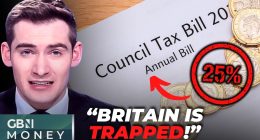The Bank of England is expected to make a landmark decision this Thursday, with economists predicting it will cut the base rate to 4% – the lowest level since March 2023. This anticipated move would mark the fifth reduction since rates peaked at 5.25% in August last year.
Why the Rate Cut is Expected
Financial experts cite several key factors driving this decision:
-
Falling Inflation: With CPI inflation currently at 3.6% and projected to decline further, the Monetary Policy Committee (MPC) appears confident in easing monetary policy. As reported by BBC Business, inflation is expected to approach the Bank’s 2% target by year-end.
-
Weakening Labor Market: July’s unemployment rate rose to 4.7%, its highest since 2021. Pantheon Macroeconomics notes this “loosening” labor market reduces inflationary pressures, giving the MPC room to act.
-
Dovish Shift: Analysis from Financial Times suggests growing support among MPC members for more aggressive rate cuts, with some potentially advocating for a 0.5% reduction.
What This Means for Consumers
Mortgage Holders
-
Tracker mortgages will see immediate reductions
-
Standard variable rates will follow suit
-
Fixed rates may decline if markets anticipate further cuts, though swap rates remain volatile
As noted by MoneySavingExpert, borrowers should compare deals carefully as lenders may not pass on full reductions.
Savers
-
Instant access savings rates likely to fall
-
Fixed-term bonds may offer better protection
-
NS&I products could become more competitive
Expert Predictions Diverge
While most analysts expect a 0.25% cut this week, opinions vary on future moves:
-
Deutsche Bank forecasts rates falling to 3.25% by February 2025
-
Pantheon predicts no further cuts after August
-
RSM UK‘s Thomas Pugh anticipates a three-way split in MPC voting
Market Implications
The decision could:
-
Boost UK stock markets, particularly rate-sensitive sectors
-
Weaken the pound against major currencies
-
Impact gilt yields and pension fund valuations
As Reuters reports, traders will scrutinize the MPC’s forward guidance for clues about future policy direction.
What Happens Next?
With three remaining MPC meetings in 2024 (September, November, December), much depends on:
-
Inflation trajectory
-
Wage growth data
-
Global economic conditions
Consumers are advised to:
-
Review mortgage options
-
Lock in savings rates
-
Monitor inflation-linked investments
For real-time updates on the Bank’s decision, follow Bank of England official channels.
This developing story could significantly impact millions of UK households – stay informed to make the best financial decisions in this changing rate environment.








